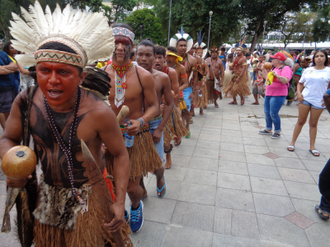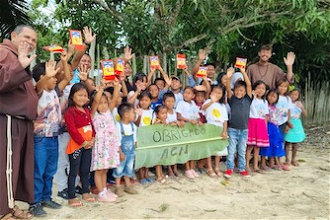AMAZONIA SYNOD 1: Why a Synod on Amazonia?

Indigenous bands attend Social Justice Forum - image: Colin McLean SSC
The Vatican will host a Synod on Amazonia in October 2019. In the first of a series of articles by members of the Columban Missionary Society, Fr Peter Hughes gives the background to the Synod. An Irish Columban priest from Mayo, he has spent five decades as a missionary in Latin America, based primarily in Peru. He supports Church initiatives to protect the biodiversity of life in the Amazon and the indigenous people of the rainforest. Peter is an advisor to the Instituto Bartolome de las Casas and CELAM, the collegial council of Latin American bishops. He works with REPAM, the Pan-Amazonia Ecclesial Network, and is helping the network prepare for the Synod on Amazonia.
A Synod of Bishops for the Pan-Amazon region is scheduled to meet in Rome in October 2019 with the theme, 'The Amazon: New paths for the Church and for integral ecology'. Why?
The answer is that the Amazon is of increasing importance both in itself, a geographical region which occupies almost half the South American subcontinent, and also a biosphere under pressure regarding universal planetary issues. These include climate equilibrium and future availability of basics such as water and air. What is now happening in the region has significance for future life on the planet.
The area covered by the world's largest tropical rainforest has traditionally been regarded as largely unexplored: home to scattered and isolated ethnic groups of little importance, a backwater for production of raw materials, timber and a rubber boom at the turn of the twentieth century. Today, the region is the target for huge capital investment in the exploration, production and exportation of commodities, energy resources of oil and natural gas, electricity through construction of mega hydroelectric dams; mining and precious metals; the expansion of vast areas of land for agribusiness by burning the rainforest for production of sugar, soya and palm oil. The Amazon has been transformed, negotiated by nation states giving concession rights to global corporations for exploitation of its natural resources with little or no regard for ecological environmental preservation and the rights of its original inhabitants.
The Amazon is now a first link in the production chain for the massive, expanding consumer culture that defines the malaise of our civilisation. The symbols run from the powerful tractors that grind swathes of destruction through the rainforest to journey's end in the ultra-creative IT world of Silicon Valleys. The cost of this transformation - too often named progress or development - is the death of the rainforest, ethnic groups forced to flee their lands, and the diminishment of biodiversity. Recent decades have also witnessed the urbanisation of the Amazon.
The Pan Amazon region is the richest geological and most complex biosphere on the planet, containing a third of the world's biodiversity as well as half the species that have so far been discovered. The territory covers 7.8 million square kilometres, and the river Amazon itself is nearly 7,000 kms long - the world's largest navigable river. The area is shared by nine countries, from Brazil (67%) to the tiny Guianas (0.1%). It is home to nearly three million indigenous people from 390 ethnic groups who speak 240 languages, belonging to 49 linguistic families.
The destruction of peoples in the region is of communities intimately related and integrated to a territory, a composite which is one integrated reality. Their cosmic worldview does not admit separation between humans, the environment and other lifeforms. All life is part of the created, seamless natural order. The ancestral wisdom constructed over generations of how to build a respectful and lifegiving relationship with a most difficult and hostile environment is now in danger. When people's lands are confiscated, rivers contaminated, fish dying because of mercury and lead in the waters, they feel the plunder is taking their lives away, and there is no place to flee to. A way of life composed of different communal dimensions, cultivating the soil, fishing, hunting, rituals of ancestry, feasting and celebration, is now destined to extinction. Life has been overshadowed by gloom, darkness, illness. The rhythms and cycles of seasons, of death and regeneration, are now overtaken by hopelessness. Beauty has been replaced by ugliness. The aesthetic or artistic expression are no longer relevant. A sense of death of the spirit is pervasive. Unfortunately, the recently installed new regime in Brazil does not augur well for the future.
Latin American economies are still dependent on exportation of raw materials. The demand for commodities in the burgeoning Asian markets has welded economic policies to welcoming foreign investment. Extractive corporations are guaranteed a lush dividend while the locals are doomed to accept meagre pickings. Corruption of public officials in relation to contracts is rampant. Former presidents and high officials are imprisoned or have fled, accused of taking huge bribes from a single Brazilian company, Odebrecht, the major constructor of interoceanic highways. The destruction in the Amazon puts in jeopardy the future of the world's drinking water as well as the amount of oxygen in the atmosphere. It also affects directly the chaotic effects of climate change, increases in flooding and droughts throughout the planet.
Hopes for the Synod
In his encyclical Laudato Si', Pope Francis insists on a recurrent theme, that "everything is interconnected" (LS 138). This profound insight, held in common with the great religious and cultural traditions, is the spiritual bedrock of the encyclical. This perspective of interconnectedness of creation has, to a great extent, become a victim of scientific discovery and technological progress of the industrial revolution through to the modern period. From a previous more balanced relationship of equilibrium and respect for nature, we have unwittingly launched on a course that nature must be conquered and made subservient to human demands. The benefits of conquest have certainly improved living conditions generally. Humanity has flourished in so many fields, such as medicine, education, industry. However, we have reached the point where nature has called a halt, her limits are visible due to the unbounded excess of conquest and domination.
Francis calls for a profound change of direction - we must forsake an aggressive stance towards nature and replace it with respect, equilibrium and harmony. This has been the Christian tradition through the ages. Wonder, awe, admiration at the marvellous works of creation have inspired the great spiritual movements of the Celtic tradition and mystics, Hildegard of Bingen, the theology of Albert the Great and Thomas Aquinas. Respect and care for biodiversity is a hymn of praise to God who is, in the expression of Latin American bishops, is wise, beautiful and provident. Francis makes a plea to abandon our habit of seeing two separate crises - the social economic and the ecological environmental - in favour of "one complex crisis which is both social and environmental". He says, "strategies for a solution demands an integrated approach to combating poverty, restoring dignity to the excluded, and at the same time protecting nature." (LS #139).
A Synod is a special time for the Church as People of God to walk together and share with respect and freedom on a major issue. Pope Francis, deeply concerned about the plight of the Amazon, has convoked a special Synod later this year. He challenged the Brazilian bishops in July 2013 to engage with new initiatives that must be bold and brave to save the Amazon, underlining that 20 percent was already irrevocably lost and the trend must be halted. For Francis, the Amazon is a major challenge for the Church in Latin America and beyond.
The Amazon Synod highlights the importance of the periphery as the new centre of God's presence in history. The church must relocate there. Through the combined initiative of CELAM (bishops), Caritas Latin America, CLAR (religious congregations) a new mode of carrying out the Church's mission based on networking has been launched. Beginning in Ecuador, a peripheral country in the periphery, REPAM - the Pan-Amazonia Ecclesial Network - was created. REPAM is not another institution but rather a service to articulate, connect and strengthen the work of the Church in the Amazon region so that its cry of pain can be heard and transformed into new life. REPAM is committed to the search for a true Amazonian face for the Church, inspired by love for the indigenous people. It empowers the missionaries who have courageously shared their lives through a spirituality of incarnation and the inculturation of the message with respect and recognition of different cultural identities. The REPAM experience has subsequently inspired similar initiatives in the Congo basin in Africa, Mesoamerica and the Guarani basin, Paraguay.
The Synod was inaugurated in January 2018 during Pope Francis' historic visit to the Amazon in Puerto Maldonado, Peru and continues to October 2019. The groundwork and trajectory of REPAM has assisted the Synod preparations. The preparatory discussion document has been studied with a view to formulate suggestions for new and more effective ways and methods for the Church's mission. To date, 45 territorial meetings have been celebrated with the active participation of the nearly 100 Apostolic Vicariates, the local churches of the Amazon. The quality of these meetings has been remarkable, providing a platform for free and open dialogue and opinion on the major issues with the express encouragement of the bishops always present. The overwhelming feeling is the joy of having the opportunity to express their own voice. The result of the consultation process will be the basis for the working document of the Synod.
Special events for indigenous leaders, women, issues relating to frontier situations rife with narcotic and human trafficking, child prostitution, as well as events inviting civil society and non-governmental organisations are also taking place. The input from the "other jungle", the northern hemisphere, is particularly important. Events have been held in response to invitations from the European and German parliaments. Georgetown University, Washington DC, will host an event for Church and civic leaders as well as representatives from the Interamerican Commission for Human Rights and raporteurs for human rights from the UN Permanent Forum for Indigenous Peoples.
The Synod is an important moment for the voice of the Amazon and its peoples to be heard. Their cry, absent until now, arrives on the agenda of society at large and the Church. It provides a wonderful opportunity for genuine, open and respectful dialogue to answer the call of the title of the Synod. The expectation is for genuine dialogue, issues to be discussed and doors to be opened. The Church of the Amazon and the universal Church await new pathways, new presence, new ministries - especially for laity and women - sensitive to changing cultural codes. The words of Dom Erwin Kreitler, bishop of Xingú, Brazil are clear, "the people have the right to speak, to be listened to and the Church must act seriously".
Watch Fr Peter Hughes speaking at the National Justice and Peace Conference, Britain, July 2017:


















